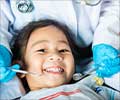
According to the U.S. Centers for Disease Control and Prevention (CDC), approximately 33 million children ride bicycles for nearly 10 billion hours each year. Unfortunately, bicycle crashes and bicycle-related head injuries cause 150,000 emergency department visits and nearly 400 deaths each year.
In the abstract, "Racial/Ethnic and Socioeconomic Disparities in the Use of Helmets in Children Involved in Bicycle Accidents," researchers reviewed the records of all pediatric patients involved in bicycle-related accidents from the Los Angeles County database between 2006 and 2011. The information included helmet use, age, gender, insurance status and race/ethnicity. Further analysis sought to determine whether helmet use was associated with the need for emergency surgery, morbidity, mortality and length of hospital stay.
There were 1,248 children involved in bicycle-related accidents in Los Angeles County. The median age of these children was 13; 64 percent were male. Overall, 11.3 percent of patients wore helmets, with some ethnic-based differences: 35.2 percent of white children wore helmets, compared to 7 percent of Asian children, 6 percent of black children, and 4 percent of Hispanic children. Researchers also observed differences based on insurance coverage, with 15.2 percent of children with private insurance coverage and 7.6 percent of children with public insurance wearing helmets at the time of injury. Children over age 12 were less likely to wear a helmet.
Overall, 5.9 percent of the injured children required emergency surgery, and 34.1 percent of the children returned to their pre-injury capacity. The mortality rate was 0.7 percent. Of the nine patients who died, eight were not wearing a helmet.
"Our study highlights the need to target minority groups, older children, and those with lower socioeconomic status when implementing bicycle safety programs in Los Angeles County," said study author Veronica F. Sullins, MD.
Advertisement
"Children and adolescents have the highest rate of unintentional injury and therefore should be a high priority target population for injury-prevention programs," Dr. Sullins said.
Advertisement









